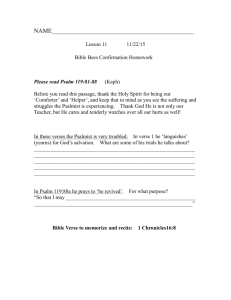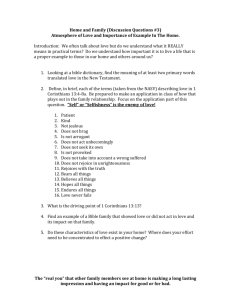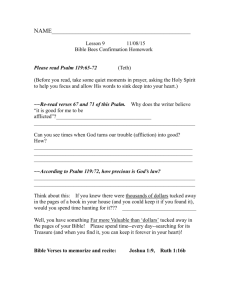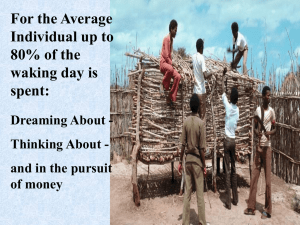2 What the Bible says about money Section
advertisement
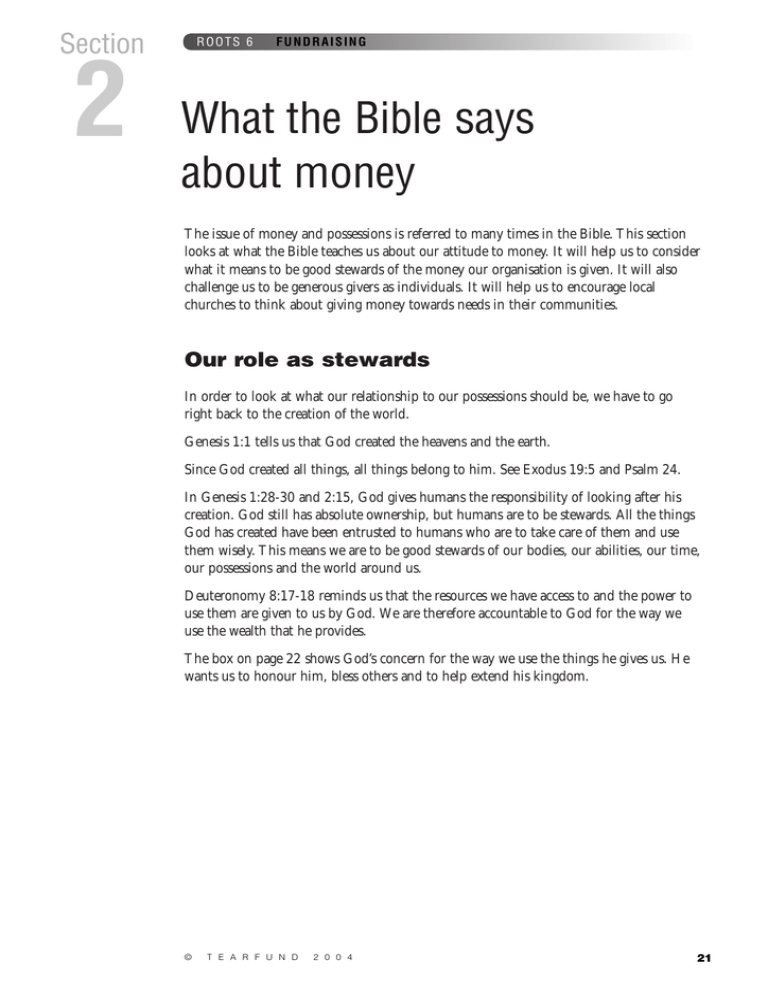
Section 2 ROOTS 6 FUNDRAISING What the Bible says about money The issue of money and possessions is referred to many times in the Bible. This section looks at what the Bible teaches us about our attitude to money. It will help us to consider what it means to be good stewards of the money our organisation is given. It will also challenge us to be generous givers as individuals. It will help us to encourage local churches to think about giving money towards needs in their communities. Our role as stewards In order to look at what our relationship to our possessions should be, we have to go right back to the creation of the world. Genesis 1:1 tells us that God created the heavens and the earth. Since God created all things, all things belong to him. See Exodus 19:5 and Psalm 24. In Genesis 1:28-30 and 2:15, God gives humans the responsibility of looking after his creation. God still has absolute ownership, but humans are to be stewards. All the things God has created have been entrusted to humans who are to take care of them and use them wisely. This means we are to be good stewards of our bodies, our abilities, our time, our possessions and the world around us. Deuteronomy 8:17-18 reminds us that the resources we have access to and the power to use them are given to us by God. We are therefore accountable to God for the way we use the wealth that he provides. The box on page 22 shows God’s concern for the way we use the things he gives us. He wants us to honour him, bless others and to help extend his kingdom. © T E A R F U N D 2 0 0 4 21 2 What the Bible says about money ROOTS 6 FUNDRAISING Land in the Old Testament In the Old Testament we read that God provided the Israelites with land to live on as proof of his relationship with Israel. God laid down a set of laws so that the Israelites would be responsible to God for the land and each other. ■ RESPONSIBILITY TO GOD This included tithing and offering the firstfruits of the harvest to God (Exodus 23:14-19). Leviticus 25:23 is a reminder of God’s ultimate ownership of the land and authority on how it should be used: ‘The land must not be sold permanently, because the land is mine and you are but aliens and my tenants.’ ■ RESPONSIBILITY TO OTHERS This included enabling the poor to gather the gleanings of the harvest (Leviticus 23:22) and to benefit from the tithes (Deuteronomy 14:28-29, 26:12) in certain years. To stop people becoming wealthy at the expense of others, God did not allow land to be sold permanently. Instead, during the year of Jubilee (every 49 years), land which had been sold was returned to the original owner. This ensured that future generations had access to land. It also meant that the price of land decreased as the Jubilee year approached, so that nobody was taken advantage of (Leviticus 25:14-17). Based on Living as the people of God (1983) by Christopher Wright, IVP It is important to note that God provided the Israelites with land to live on as a blessing – out of his goodness and not because they deserved it. Likewise, the wealth we have should be viewed as a gift from God and not as something that we have a right to. Riches and blessing are not necessarily linked. Many people in the Bible who served God faithfully were materially poor. A common worldview is that having wealth is important. It is often assumed that money is the only way that God blesses us. In fact, being blessed with money gives us greater responsibility. We have to be careful not to love the money we have at the expense of our relationship with God. Reflection ■ If we borrowed someone else’s bicycle, would our treatment of it be any different than if it was our own? Why? ■ What about the money our organisation is given? What should our attitude towards it be? 22 T E A R F U N D R O O T S R E S O U R C E S 2 What the Bible says about money ROOTS 6 FUNDRAISING Our attitude towards money The way we handle our possessions is an indication of our commitment to God. God focuses not so much on what we have but on our attitude towards what we have. For example: ■ The tenth Commandment is ‘You shall not covet’ (Exodus 20:17), but we find ourselves comparing our circumstances with others. We often view each other in terms of material wealth before anything else. ■ Our attitude towards money has a big impact on our relationship with God. In Deuteronomy 8:10-14, God is concerned that our greedy view of material things will make us proud and forget God and his goodness to us. This is reflected in Proverbs 30:8-9, ‘…give me neither poverty nor riches, but give me only my daily bread. Otherwise, I may have too much and disown you and say “Who is the Lord?” Or I may become poor and steal, and so dishonour the name of my God.’ ■ The New Testament encourages us to guard carefully against the pursuit of riches. Jesus did not say that being rich is wrong, but he had a lot to say about priorities and attitudes towards the money we have. For example, Jesus tells us to guard against greed (Luke 12:15). The following Bible studies challenge us to look at our attitude towards money and possessions. Only when our attitude is right will we use money in a way that serves God and those around us. We cannot serve both God and money BIBLE STUDY ■ Read Matthew 6:19-34. This passage is part of the ‘Sermon on the mount’. Jesus is speaking to his disciples, telling them about the Kingdom of God. • Why should we not store up treasures for ourselves on earth? • What does it mean to store up treasures in heaven? • How are Kingdom of God attitudes different from the world’s? • What point is Jesus making in verse 24? • What do these verses say about what our attitude to money should be? Is it wrong to be rich? If not, why not? • Verse 24 says that we can serve either God or money but not both. What practical steps can we take to ensure that we do not become tempted to serve money? • How do verses 25-34 encourage us as we avoid serving money? • What does the passage tell us about the security we find in God? How does that compare with the security we find in money? • How does this passage challenge us as we consider how we use our money: – individually? – as an organisation? © T E A R F U N D 2 0 0 4 23 2 What the Bible says about money ROOTS 6 FUNDRAISING Our attitude towards possessions matters BIBLE STUDY ■ Read Luke 12:13-21. • What does Jesus warn about in verse 15? How is this shown in the parable that follows? • Look at how many times the rich man in the parable says ‘I’, ‘my’ and ‘myself’. What does this say about his attitude towards his possessions? • Do money and possessions help or hinder this man in his relationship with God? • What does it mean to be ‘rich towards God’? Are we? • Read Psalm 49. Summarise the Psalm in a sentence. How does this Psalm challenge us in the way we use our possessions? • How do these passages challenge us as we consider how we use our money: – individually? – as an organisation? There are many reasons for giving to poor people, which include: 24 ■ giving money to the needy was praised and encouraged in the early church (eg: Acts 4:32-35, 1 Corinthians 16:1-4, Galatians 2:10) ■ our calling to be compassionate (Deuteronomy 15:7-11; 1 John 3:17) ■ showing our obedience to the gospel. In Luke 19:1-10, Zacchaeus showed true repentance by showing that he could be freed from his attachment to his possessions. He demonstrated that he could trust God by giving away half his possessions to poor people. T E A R F U N D R O O T S R E S O U R C E S 2 What the Bible says about money ROOTS 6 FUNDRAISING We are called to give BIBLE STUDY ■ Read 2 Corinthians 8:1-15. In this passage, Paul encourages the rich Corinthians to be generous and uses the model of the Macedonians who were poor. • What is the motivation behind the giving of the Macedonians? • Does our church most resemble the church in Corinth or the church in Macedonia? • How have we come to this conclusion? • How does this passage challenge us in our attitude to giving? • Notice how Paul encourages the Corinthians to give: – He acknowledges their other gifts (verse 7). – He recognises that they had begun to give (verse 10). – He gives the model of the Macedonians, emphasising God’s grace as their motive. • What could church leaders today learn from the way Paul encouraged others to give? ■ What wrong motives for giving might people have? Read 2 Corinthians 9:6-15. • What prompts people to be cheerful givers? • Verse 7 calls us to be ready to give. What does this mean practically? • What is generous giving? • How do we know how much to give away? • In verses 10-15, what are the results of generous giving? • What does Paul mean in verse 11 by ‘being made rich in every way’? • How would we answer someone who claimed that giving generously will result in health and wealth for the giver? ■ The three points of John Wesley’s sermon on The Use of Money, based on Luke 16:9 are ‘Earn all you can, save all you can, so that you can give all you can.’ • Do we agree with this statement? • How does this work in practice in our individual lives and our organisation? • Is it easier to earn, save or give? • How can we get the balance right? © T E A R F U N D 2 0 0 4 25
